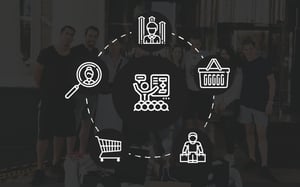A mystery shopper can tell you a lot about your store. And it’s not just what you want to hear like how great your customer service is. They can also tell you where you need to improve. While the former can help boost your ego, it’s the latter function that makes mystery shopping such a powerful tool.
Why is a mystery shopping capability necessary?
Mystery shopping, both as an idea and as a practice has been around for almost 80 years, having begun in the 1940s. Within that time, it has evolved to such an extent that it has become a crucial part of any retailer's in-store strategy. Why?
Let’s take a look at its definition: Mystery shopping is a tool that is used by market research firms, various organisations, and companies to measure, among other things, the quality of service that is on offer. A mystery shopper is, of course, the person who visits the business and conducts the research.
In the context of a retailer, you can take that even further. Such a capability gives you the opportunity to answer questions about your products, look at whether the layout is just right or needs work, and observe how your shoppers shop your various categories.
In a previous article - Here’s What a Mystery Shopper Can Teach You About Your Business - we touched on what they can help your store with. In that piece, it was about looking at the broader aspects. A mystery shopper can also take a highly granular look at your store.
In going to such a level, they can focus exclusively on the finer details besides your products and layout. For example, they can observe whether your staff greet them, and how. If they ask a question, they can test whether your staff simply answers the question or goes into more detail about an aspect without further prompting.
In having a mystery shopping capability, you have the opportunity to test any and every aspect of your store.

What are the different approaches to setting up a mystery shopping capability?
Once you’ve decided that mystery shopping is right for you, the next step is to figure out how to approach it.
There are generally two different methods to consider when it comes to setting up a mystery shopping capability
The first is to outsource it. That can be done to either a market research company or a mystery shopping agency. The second is to employ an in-house team.
If you’re unsure about which route to take, ask yourself this: is there an external provider who can perform this function better than me, and at a cheaper rate? If yes, then outsourcing is the way to go.
If you are looking for a mystery shopper agency, just be careful of any scams. One way of ensuring that the agency you want to hire is legitimate is by checking if they’re a member of the Mystery Shopping Providers Association.
That is not to say that in order for a mystery shopper agency to be legitimate it has to be a member of the MSPA. There will be a few that are either members of a different organisation or are on their own. However, you can’t just pick any agency to help you; your research is key.

Comparing advantages and disadvantages of each method
While there are only two methods to consider when it comes to setting up a mystery shopping capability, that doesn’t mean it’s an easy decision.
One of the best ways to make the decision process easier is to weigh up the advantages and disadvantages of both. First up is your outsourcing method.
Outsourcing
Using a mystery shopping agency is the most popular method. That’s because as a retailer, you don’t have to do much besides setting up a brief for a mystery shopper to follow.
Advantages:
- There is less risk of being associated with your permanent staff;
- A mystery shopper agency has the right infrastructure and their skilled staff are ready to go at any time. That makes it highly convenient; and
- An agency that specialises in mystery shopping will continuously refine its model and methods so you don’t have to worry about whether or not they’re up to standard.
Disadvantages:
- An agency will typically have a wide variety of clients so your research project won’t always be their number one priority; and
- While you can give an agency the brief, you will have less control over how the process unfolds.
In-house
If you don’t want to spend money on going outside of your business (or it’s too expensive), you can also look internally for help. Money doesn’t have to be a motivating factor though. If you’re a larger retailer or supplier with the capability, going in-house is worth it too.
Advantages
- Mystery shopping will become part of your core culture;
- You’ll have complete control over the research objectives and how the mystery shop is conducted; and
- Since you’re going internal, your team will be able to focus exclusively on your research projects.
Disadvantages
- If you’re not always running mystery shopper exercises, you could essentially be wasting money that could be used elsewhere; and
- Since you are not an agency that specialises in mystery shopping, it can prove difficult to keep up to date with best practices.
When it comes to choosing which mystery shopping method to use, it’s really all up to you and what you want to achieve with your store.
Conclusion
Regardless of which route you decide to take, one thing is clear: mystery shopping is a valuable tool that can help you to improve your store’s overall performance. Who wouldn’t want that?
Are you a retailer interested in providing a better service for your customers? Why not download our FREE Shopper ebook. In it, you’ll find some consumer-centric tactics that will allow you to put your customers first. You’ll also learn how you can take your customer service to the next level.



